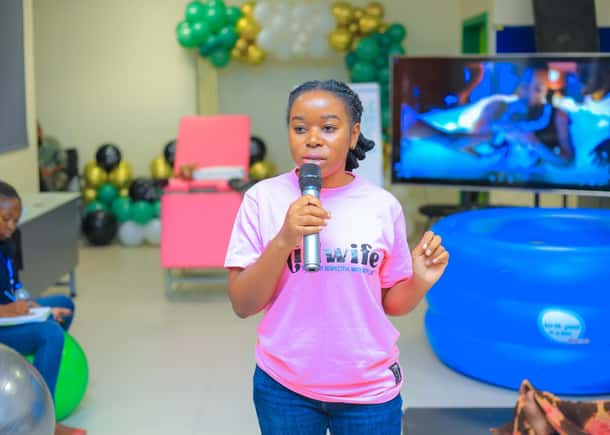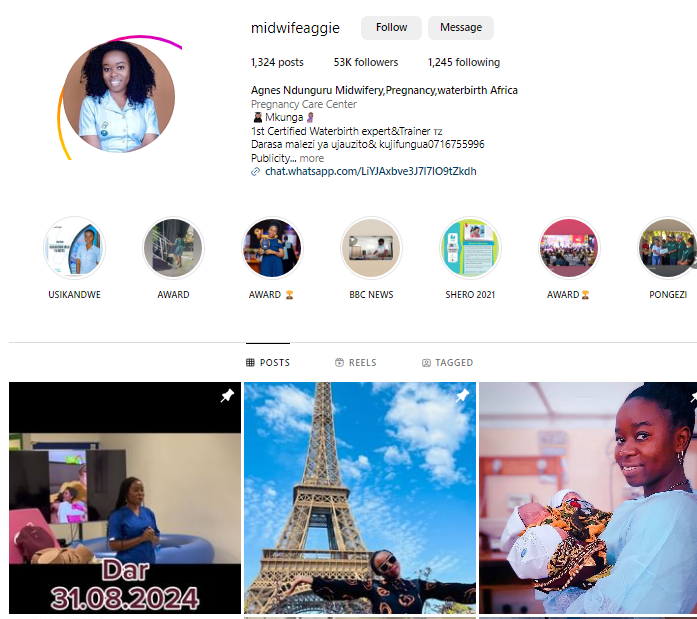A Q&A with Midwife Aggie: Positively influencing Maternal Health


Tell us a bit about your professional background
I am a dedicated and passionate midwife with 10 years of experience in providing comprehensive care to women throughout their pregnancy, labour, and postpartum period. I have attended more than 2000 births, received a diploma in Nursing and Midwifery from Hubert Kairuki Memorial University. I earned my Bachelor of Science in Midwifery from Victoria University, and completed a graduate program in Nutrition in Pregnancy and Children from Boston University. Also, I am the first ever certified water birth midwife from Water Birth International. I am also currently pursuing an Advanced Postgraduate Program (Nutrition in Children).
I have been recognized for my contributions to the field with several awards, including the Superwoman award 2021 - Tanzania, A good change agent in 2018 - Sinza Hospital, Best Nurse & Midwife in Ubungo Municipal 2022 and others.
You have a large following on social media. What is it that you share with your followers?
I have a vibrant social media presence with a following of over 47K across platforms like Instagram. My content primarily focuses on midwifery, women's health, and pregnancy wellness. I share a mix of educational posts, personal experiences, and inspirational stories to support and empower women throughout their pregnancy and postpartum journey.
My goal is to make complex medical information accessible and understandable, helping my followers make informed decisions about their health and well-being.
I regularly engage with my audience through Q&A sessions, live videos, and Whatsapp groups. Visually, I strive to create content that is both informative and aesthetically pleasing, engaging and entertaining my followers. I use high quality images and videos to illustrate key points and share behind the scenes of my work as a midwife.
The feedback from my community has been incredibly positive. Many followers have shared stories of how my content has helped them feel more confident and prepared for childbirth and motherhood.

What made you want to join social media and share your work?
My motivation to join social media and share my work as a midwife started from a deep desire to extend my reach beyond the clinic and make a broader impact on women's health. I realized that social media could be a powerful tool to educate, inspire, and support women during one of the most significant times in their lives. One pivotal moment that inspired me was when I shared the following:
· Helping a baby breathe using the Laerdal Global Health Upright Bag Mask.
· Vaginal birth after C-section: Many women lack evidence-based information.
· Water birth: this is a new practice in Tanzania, so it is very interesting to many.
I wanted to create a platform where I could share reliable, evidence-based information and empower women to make informed decisions about their health and their babies.
My primary goal in joining social media was to provide accessible, high-quality information about midwifery and women's health. I wanted to address common concerns and questions that women have. By sharing my knowledge and experiences, I aimed to de-mystify the birthing process and promote a sense of confidence and calm among expecting mothers.
What drives you to share your work on social media?
Another significant reason for my social media presence was the opportunity to engage with a wider community. Social media allows me to connect with women from diverse backgrounds and locations, offering support and guidance that they might not otherwise receive. It's incredibly rewarding to interact with my followers, answer their questions, and hear their stories.
Through my content, I strive to inspire and empower women by sharing positive birth stories, practical tips, and expert advice. I also hope to influence the broader conversation around women's health and midwifery, advocating for more personalized and respectful care practices.
Joining social media has been a fulfilling journey, as it has allowed me to make a tangible difference in the lives of many women and midwives. I am committed to continuing this work, sharing valuable content, and building a supportive and informed community.
How has a presence on social media like yours and others in your profession shaped women's perceptions of childbirth in Tanzania?
Social media has become an influential tool in shaping women's perceptions of childbirth in Tanzania, providing a platform for education, empowerment, and cultural change. As a midwife active on social media, I have witnessed firsthand the positive impact that sharing credible and reliable information and personal experiences can have on women's understanding and attitudes toward childbirth.
One of the most significant ways social media has influenced perceptions is by providing Tanzanian women with access to reliable, evidence-based information. This information helps women make informed decisions about their health and birthing options, reducing fear and uncertainty.
Social media also plays a crucial role in changing cultural norms and breaking down misconceptions about childbirth and midwifery. By sharing positive birth stories, highlighting the benefits of midwifery care, and promoting evidence-based practices, my colleagues and I are helping to normalize midwifery and encourage a more open and informed dialogue about childbirth. This shift in perception is crucial for increasing the acceptance and utilization of midwifery services.
There have been numerous instances where social media has made a tangible difference. For example, I received a message from a woman in a rural area who, after following my content, felt confident enough to advocate for a midwife-assisted birth at her local health centre. Her experience was positive, and she credited the information and support she found on social media for her successful birthing experience. Stories like hers highlight the profound impact social media can have on individual lives.
Do you have specific involvement of pregnant women and mothers outside the obstetric management?
I am deeply involved in supporting pregnant women and mothers through a variety of community-focused activities, including baby showers and prenatal classes. These initiatives are crucial for fostering a supportive environment and ensuring that women feel empowered and prepared for motherhood.
Baby Showers: baby showers are cherished and offer a wonderful opportunity to celebrate the upcoming arrival of a new baby. So, I always tell them, “While your friend showers you with gifts, I am here to shower you with birth preparedness education.” So it is a kind of prenatal class.
Prenatal Classes: I also offer comprehensive prenatal classes designed to educate and empower expectant mothers. These classes cover a wide range of topics, including pregnancy nutrition, exercise, labour and delivery processes, pain management techniques, and newborn care. By providing evidence-based information and practical skills, these classes help women understand what to expect during childbirth and how to care for themselves and their babies postpartum. The interactive nature of the classes allows participants to ask questions, share concerns, and connect with other expectant mothers, creating a supportive learning environment.
Can you share a story of how these experiences have helped mothers?
One particularly memorable experience was organizing a baby shower for a first-time mother who was new to our community. She was initially anxious about her pregnancy and felt isolated. Through the baby shower and subsequent prenatal classes, she connected with other mothers, gained confidence in her ability to care for her baby, and developed a strong support network. Her positive experience is a profound example on how impactful these activities are on the lives of women.
In your opinion, what more could be done to improve the care mothers and babies receive in Tanzania?
In my opinion, training and supporting healthcare providers are important activities. Providing continuous education and professional development for midwives, nurses, and doctors will keep them updated with the latest best practices in maternal and newborn care. Additionally, increasing the healthcare workforce by training more midwives
Policy and advocacy efforts are also important. We need stronger government policies and increased funding for maternal and child health programs. Encouraging collaboration between government agencies, Professional associations, non-governmental organizations, and international partners will help address maternal and newborn health comprehensively.
Finally, improving data collection and research is essential.